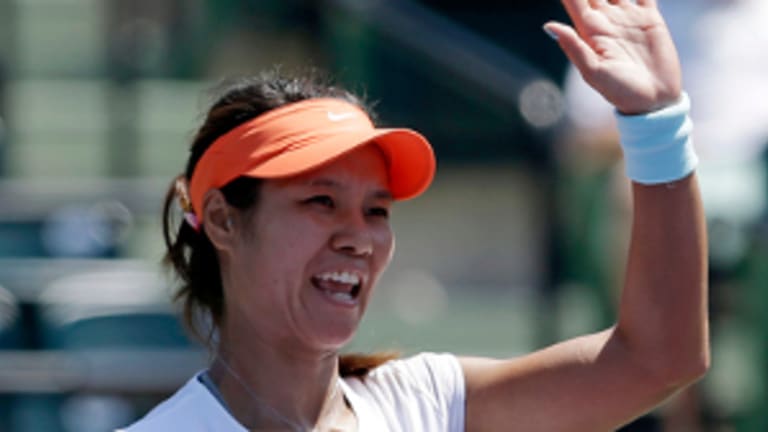MIAMI, Fla.—Thirty-two-year-old Li Na knows what it’s like to be 19-year-old Madison Keys, and she’d just as soon not have anything to do with it anymore. But today she was happy to revisit that age and the state of Keys’ development after a series of impressive escapes left the world No. 2 a 7-6 (3), 6-3 winner in their third-round match today.
“I think when I was same age like her—I think she's much, much better than me,” Li said afterward.
“You know, Americans have a long history about tennis. So she was learn tennis in America, so they have high, how do you say, high goal(s). . . They have so many tennis star in America. So they looking forward for No. 1 in the world.”
It’s a good point, this difference in the baseline of expectations, but it’s still also true that there’s a great difference between playing a good match and winning a good match. That’s the part that even the distinguished honor roll of American tennis champions cannot help a young player like Keys master.
Keys had two more break points in this match than did Li (12-10), but she converted one fewer (four to Li’s five). Ultimately that spelled the major difference.
The two women had met twice before, last year, with Li winning in three sets on a hard court in Sydney. But Keys caught Li napping in Madrid on clay, and won with surprising ease, 6-3, 6-2. And Keys has undoubtedly gotten better in the interim. She looks both slimmer and stronger—changes that did not go unnoticed by Li. All that helps explain how Keys recovered from a 1-3 deficit to find herself serving for the first set at 5-3, eventually earning three set points.
Li wiped away the first of those landmines with her money shot, the down-the-line backhand. She survived the second set point by smacking a forehand winner to get to deuce. But Li saw a break-point chance come and quickly go when Keys blasted a serve past her forehand. Another winning serve gave Keys another set point—and that’s where the youngster made her critical mistake.
It was a double fault, and it probably cost Keys three points: The original, set point; the distracted, ensuing point, when she drilled a forehand into the net; and Li’s subsequent break point, when Keys erred on a down-the-line backhand. That yielded the break that kept Li’s hopes alive.
“I think she play well. . . During that time (Keys’ resurgence) I didn't think about too much. I say, ‘Okay, try to hit the ball, try to do what you have to do,’ and I think saving the set points was give me. . . not a lot (of help), but at least I was still on the first set.”
Li sensed a slight decline in Keys’ game after that, but “slight” was the operative word, as the tiebreaker demonstrated. Keys lost the first point when her inside-out forehand flew just out. After that mini-break, though, both women played sharp, probing tennis, with no more breaks of serve until Li cracked Keys a second time to take an insurmountable lead.
Keys gathered herself and remained competitive. She broke Li in the first game of the second set, and after a quick hold she pinned Li down with three more break points in the third game. A two-break lead at that point probably would have cost Li the set, but she ducked the threat the hard way: She hit a winner and a pair of unreturned serves, one off each wing, and ended up holding when Keys couldn’t handle her serve at either deuce or advantage.
Boosted by the escape, Li broke Keys in the next game for 2-2. The key shot was an uncertain backhand hybrid of slice and drop shot that Keys tried off a Li serve return. Li broke Keys again at her next opportunity, and from 4-2 she cruised over the finish line.
